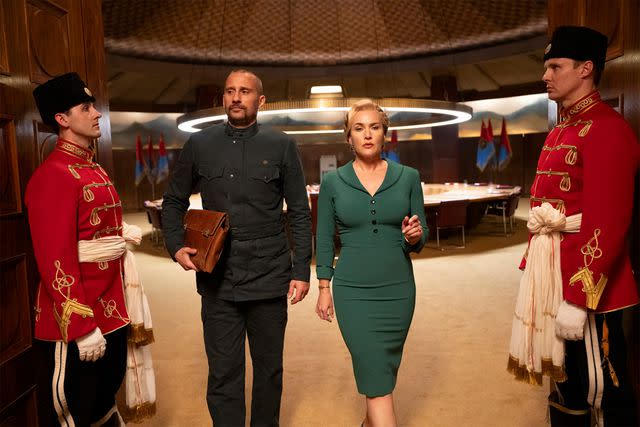“The Regime” review: Kate Winslet's dictatorship dramedy falls flat
- Oops!Something went wrong.Please try again later.
The Oscar winner stars as a paranoid autocrat in HBO's bleak and superficial new limited series.
HBO describes The Regime — starring Kate Winslet as the paranoid chancellor of a fictional Central European country — as “darkly comedic.” The trailer highlights some of the show’s kookier moments (“You all need to be better at being normal,” scolds the Chancellor, addressing her cabinet from a tub filled with ice), and the premiere does feature Winslet’s Elena Vernham performing a wince-inducing cover of Chicago’s “If You Leave Me Now” for American diplomats at a state dinner.
While it’s not quite fair to call the “darkly comedic” descriptor disinformation, the six-episode series premiering March 3 and created by Will Tracy (The Menu) is not really a comedy of any hue. A bleak, superficial exploration of the dangers of authoritarianism and the grim reality of America’s role in the oppression of people around the globe, The Regime may be timely, but it’s not particularly funny, edifying, or insightful.

Miya Mizuno/HBO
Matthias Schoenaerts and Kate Winslet in 'The Regime'Seven years into her reign, Chancellor Elena Vernham is a paranoid recluse. Terrified that she will fall victim to the same lung condition that killed her father (Finbar Lynch), Elena exists in a constant state of mysophobic panic and believes that her sprawling palace is overrun with toxic mold. Per the Chancellor’s orders, her high-strung staff — including sensible palace manager, Agnes (Andrea Riseborough), daunting minister of finance, Susan (Pippa Haywood), and obsequious Dr. Kershaw (Kenneth Collard) — bring in Corporal Herbert Zubak (Matthias Schoenaerts) as their leader’s latest “personal water diviner.” In other words, he follows the chancellor around with a hygrometer and measures the level of humidity in each room she enters.
Like his new boss, Corporal Zubak is not well. Dubbed one of the “Butchers of Site 5” after his regiment shot protestors at a local cobalt mine, Herbert suffers from crippling guilt and PTSD, which he copes with through self-harm. But in their first meeting, Elena thanks him for his service. “It’s not nice what they’re calling you,” she sniffs. “There’s a good man in there who deserves love.” A security scare at the palace — and Herbert’s willingness to criticize Elena to her face about their country’s dependence on America — leaves the Chancellor totally in thrall to the troubled soldier and his anti-imperialist views.
The Regime’s six episodes span the subsequent year as Elena adopts increasingly isolationist policies — much to the chagrin of her cabinet (David Bamber, Danny Webb, Henry Goodman) and her husband (Guillaume Gallienne) — and her government starts to buckle under the weight of Herbert’s outsized and misguided influence.
Initially, Elena’s devotion to Herbert and his “country” ways is presented as eccentric but essentially harmless, as when she orders the palace to be filled with large bowls of potatoes so she can benefit from the “healing properties” of the tubers’ steam. The Regime’s tone turns darker quickly. While the shift in mood better suits the disturbed duo at the story’s center, Elena and Hubert never feel fully human, and the motivations behind their extreme behavior are murky. Herbert grew up in poverty and exhibited violent outbursts — including toward his mother — from a young age.

Miya Mizuno/HBO
And in falling under Herbert’s spell, Elena appears to be swapping one demanding male figure — her father, Joseph Peter Vernham, who continues to lie in state in the palace basement — for another. Through the Chancellor’s frequent corpse-side chats with Joseph, we glimpse the man he was when he was alive: domineering and cruel, prone to belittle his daughter for her intelligence and the slight speech impediment that causes her lower lip to droop. All we know for sure is that Elena and Herbert are deeply, perhaps irreparably, damaged — and in turn, they inflict that damage on others.
The Regime also isn’t successful as satire, though it’s a competent depiction of the many ways dictatorships are bad. Beyond that, the show’s message seems to be that there are no good guys (or girls) in politics — indeed, that there is no such thing as an ethical leader. The ousted former chancellor Edward Keplinger (guest star Hugh Grant), who Herbert encounters in the back half of the season, is not as dedicated to the “honest working people” as his far-left policies would suggest. The leader of the inevitable resistance movement attempts to seize power without a mandate, and America — represented here by Senator Judith Holt (Martha Plimpton) — is forever working behind the scenes, complicit in it all.
The failures of The Regime are largely on the page. Elena can be confounding, but in Winslet’s hands, she’s never boring, and Riseborough’s Agnes — the only character with a modicum of empathy — makes the series’ overall misanthropy a touch more bearable. Keplinger, describing Herbert’s loyalty to Elena, scoffs, “Broken people really love broken people, don’t they?” In politics, maybe. With TV, that's debatable. Grade: C-
The Regime premieres Sunday, March 3 on HBO.
Sign up for Entertainment Weekly's free daily newsletter to get breaking TV news, exclusive first looks, recaps, reviews, interviews with your favorite stars, and more.
Related content:
Kate Winslet says post-Titanic fame was 'horrible': 'My life was quite unpleasant'
HBO boss apologizes for using fake Twitter accounts to troll TV critics
Read the original article on Entertainment Weekly.

